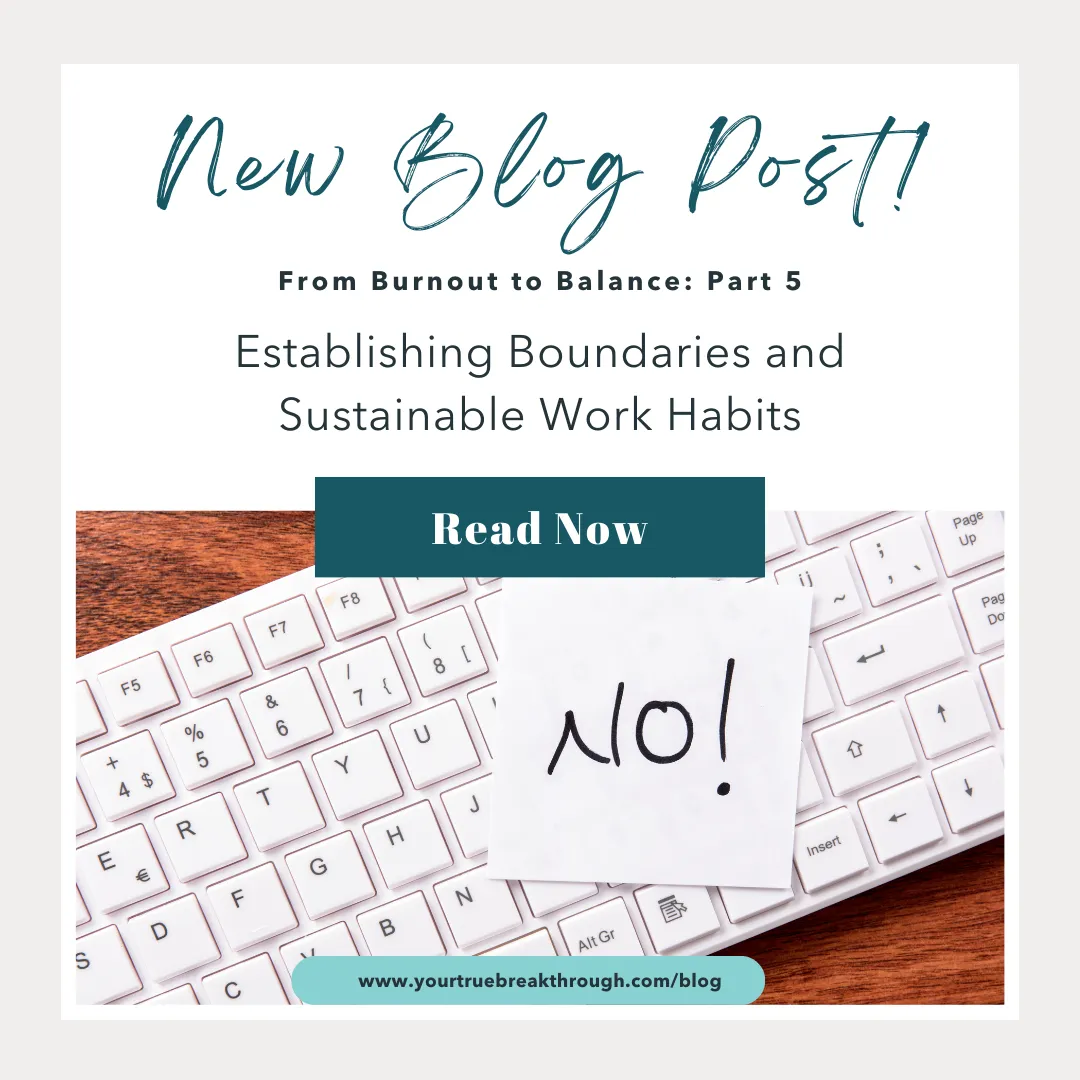Blog

From Burnout to Balance: Part 5 - Establishing Boundaries and Sustainable Work Habits
Welcome back to the final installment of our series on transitioning from burnout to balance. We've journeyed through recognizing burnout signs, understanding emotional processing, the role of self-care, shifting perspectives, taking action, and nurturing professional growth and connections. In this concluding part, we'll focus on establishing boundaries and cultivating sustainable work habits, the final pieces of the puzzle in achieving and maintaining a balanced professional life.
The Art of Setting Boundaries
Setting boundaries is an essential skill in maintaining work-life balance and avoiding burnout. It's about defining what is acceptable and what isn't in your professional and personal life. Here are some tips to help you set effective boundaries:
Understand Your Limits: Identify what causes you stress or discomfort. These are signs that a boundary may be needed.
Communicate Clearly: Once you've identified your boundaries, communicate them clearly to others. Be assertive, but respectful.
Learn to Say No: It's okay to say no to tasks or commitments that infringe on your boundaries. Saying no can be difficult, but it's essential for maintaining balance.
Practice Self-Care: Remember, setting boundaries is a form of self-care. It's about respecting your needs and well-being.
Cultivating Sustainable Work Habits
Developing sustainable work habits is crucial for preventing future burnout and promoting long-term well-being. Here are some strategies to help you cultivate these habits:
Prioritize Tasks: Not all tasks are created equal. Learn to prioritize your tasks based on their importance and urgency.
Take Regular Breaks: Taking short breaks throughout the day can help prevent burnout and improve productivity.
Practice Mindfulness: Mindfulness can help you stay focused on the present moment and reduce stress. This can be as simple as taking a few minutes each day to focus on your breath.
Seek Support: Don't hesitate to seek support when you need it. This could be from a mentor, a coach, or a mental health professional.
Reflecting on Your Journey
As we conclude this series, take some time to reflect on your journey. Consider the progress you've made and the strategies you've learned. Remember, achieving balance is a journey, not a destination. It's about continual growth and adaptation.
Moving Forward
In this series, we've explored various strategies for moving from burnout to balance. We've discussed the importance of recognizing burnout, processing emotions, practicing self-care, shifting perspectives, taking action, nurturing growth and connections, setting boundaries, and cultivating sustainable work habits.
If you'd like to learn more about Mindset Coaching or Hypnotherapy and how it can support your journey, book your complimentary 30-min consultation for a personalized recommendation.
As you move forward, keep these strategies in mind. Use them as tools to help you navigate your professional journey and achieve a more balanced and fulfilling life. Remember, you're not alone in this journey. There are resources and support available to help you overcome burnout and embrace a path of sustainable success and well-being.
Blog

From Burnout to Balance: Part 5 - Establishing Boundaries and Sustainable Work Habits
Welcome back to the final installment of our series on transitioning from burnout to balance. We've journeyed through recognizing burnout signs, understanding emotional processing, the role of self-care, shifting perspectives, taking action, and nurturing professional growth and connections. In this concluding part, we'll focus on establishing boundaries and cultivating sustainable work habits, the final pieces of the puzzle in achieving and maintaining a balanced professional life.
The Art of Setting Boundaries
Setting boundaries is an essential skill in maintaining work-life balance and avoiding burnout. It's about defining what is acceptable and what isn't in your professional and personal life. Here are some tips to help you set effective boundaries:
Understand Your Limits: Identify what causes you stress or discomfort. These are signs that a boundary may be needed.
Communicate Clearly: Once you've identified your boundaries, communicate them clearly to others. Be assertive, but respectful.
Learn to Say No: It's okay to say no to tasks or commitments that infringe on your boundaries. Saying no can be difficult, but it's essential for maintaining balance.
Practice Self-Care: Remember, setting boundaries is a form of self-care. It's about respecting your needs and well-being.
Cultivating Sustainable Work Habits
Developing sustainable work habits is crucial for preventing future burnout and promoting long-term well-being. Here are some strategies to help you cultivate these habits:
Prioritize Tasks: Not all tasks are created equal. Learn to prioritize your tasks based on their importance and urgency.
Take Regular Breaks: Taking short breaks throughout the day can help prevent burnout and improve productivity.
Practice Mindfulness: Mindfulness can help you stay focused on the present moment and reduce stress. This can be as simple as taking a few minutes each day to focus on your breath.
Seek Support: Don't hesitate to seek support when you need it. This could be from a mentor, a coach, or a mental health professional.
Reflecting on Your Journey
As we conclude this series, take some time to reflect on your journey. Consider the progress you've made and the strategies you've learned. Remember, achieving balance is a journey, not a destination. It's about continual growth and adaptation.
Moving Forward
In this series, we've explored various strategies for moving from burnout to balance. We've discussed the importance of recognizing burnout, processing emotions, practicing self-care, shifting perspectives, taking action, nurturing growth and connections, setting boundaries, and cultivating sustainable work habits.
If you'd like to learn more about Mindset Coaching or Hypnotherapy and how it can support your journey, book your complimentary 30-min consultation for a personalized recommendation.
As you move forward, keep these strategies in mind. Use them as tools to help you navigate your professional journey and achieve a more balanced and fulfilling life. Remember, you're not alone in this journey. There are resources and support available to help you overcome burnout and embrace a path of sustainable success and well-being.




